In "Shifting Terrain" John Visser discusses some of the unique aspects of theological education in Canada. Here, in their own words, leaders of Canadian theological schools tell us what makes their individual institution special.
ACTS Seminaries
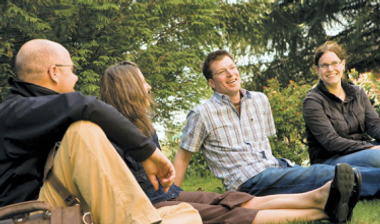 ACTS, or Associated Canadian Theological Schools, offers students a unique seminary experience, especially in North America. We are five distinct seminaries — a consortium — that together form the Graduate School of Theological Studies of Trinity Western University. Students enroll through one seminary, but study and graduate from programs that are offered jointly by all. Running a consortium like this is complex. It takes a lot of energy and commitment to get things done. The good side is that you get lots of voices, the downside is that it is hard to move quickly on things. But it is healthy for us. It forces us to always consider how we can be even more effective.
ACTS, or Associated Canadian Theological Schools, offers students a unique seminary experience, especially in North America. We are five distinct seminaries — a consortium — that together form the Graduate School of Theological Studies of Trinity Western University. Students enroll through one seminary, but study and graduate from programs that are offered jointly by all. Running a consortium like this is complex. It takes a lot of energy and commitment to get things done. The good side is that you get lots of voices, the downside is that it is hard to move quickly on things. But it is healthy for us. It forces us to always consider how we can be even more effective.
Because we are located on the campus of Trinity Western University, the largest Christian university in Canada, we have other networking opportunities that add to the experience of our students. We can offer specialized programs, including a concentration in Septuagint and a degree in linguistics and exegesis. We are also exploring the possibility of a Ph.D. program. Even as we are strengthening our core programs, we are exploring more and more ways we can expand our distance education, to reach out to all the denominations and churches we are connected to.
Ken Radant
Principal and Academic Dean
ACTS Seminaries
Langley, British Columbia
Atlantic School of Theology
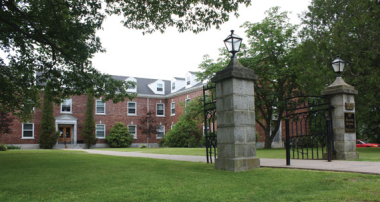 We are a tri-denominational school — United Church, Anglican, and Roman Catholic — in terms of our formal relationships. We are the only internally ecumenical school in the world that includes Roman Catholics. This is a place where everything is on an equal footing, from the board of governors right down to the classroom. Students coming out of here are versed in the reality of the ecumenical church, but also have an important sense of their own identity. That's the reality on the ground. You have to be able to serve ecumenically. It's true in chaplaincy work of course, which is profoundly ecumenical, and a strength of ours. Our school has trained almost 30 percent of the chaplains serving in the Canadian armed forces today.
We are a tri-denominational school — United Church, Anglican, and Roman Catholic — in terms of our formal relationships. We are the only internally ecumenical school in the world that includes Roman Catholics. This is a place where everything is on an equal footing, from the board of governors right down to the classroom. Students coming out of here are versed in the reality of the ecumenical church, but also have an important sense of their own identity. That's the reality on the ground. You have to be able to serve ecumenically. It's true in chaplaincy work of course, which is profoundly ecumenical, and a strength of ours. Our school has trained almost 30 percent of the chaplains serving in the Canadian armed forces today.
Our M.Div., offered by distance education, is our fastest growing program. Our joint master's degree with neighboring St. Mary's University exposes students to the disciplinary practices of both theology and religious studies.
The reality of theological education today is that our students have multiple commitments and engagements. We see distance education growing. The perception of AST as a school for Atlantic Canada is changing — to a school located in Atlantic Canada that has national and international reach.
Canon Eric Beresford
President
Atlantic School of Theology
Halifax, Nova Scotia
McMaster Divinity College
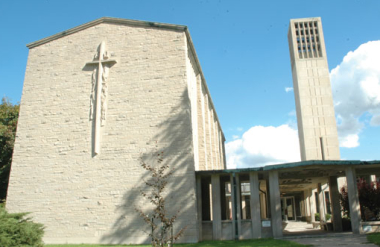 At McMaster Divinity College, we're not necessarily trying to produce pastors or a particular kind of pastor — or a particular kind of practitioner — but we want to enable people to carry out the purposes for which they are called, whatever they are. We have different programs to serve that goal, both professional and advanced. We are Baptist by heritage, but we serve almost 40 different denominations. We, and our students, benefit from having a wide range of students and denominations.
At McMaster Divinity College, we're not necessarily trying to produce pastors or a particular kind of pastor — or a particular kind of practitioner — but we want to enable people to carry out the purposes for which they are called, whatever they are. We have different programs to serve that goal, both professional and advanced. We are Baptist by heritage, but we serve almost 40 different denominations. We, and our students, benefit from having a wide range of students and denominations.
Students come to us because of our solid academic reputation, the fact that we share resources with a major university and the generous bursaries we offer because of a strong endowment program. We have excellent faculty that we have been able to grow over the years.
McMaster Divinity College is deliberate in trying to increase our name recognition in the evangelical world. In the last five years, we've made a conscious effort to be in conversation with the leading evangelical churches in Canada. Marketing is increasingly important for us. We have aggressive ideas, but we obviously have to work within budgetary constraints. Websites clearly are one of the keys to marketing today, since the vast majority of people who contact us do it through the website.
Stanley E. Porter
President and Dean
McMaster Divinity College
Hamilton, Ontario
Providence College and Seminary
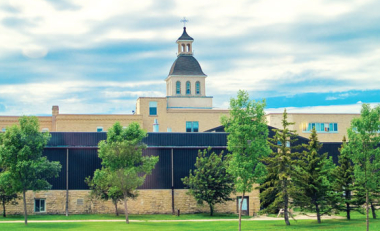 We are one of the oldest institutions on the Canadian prairies, and we are using the newest technologies to strengthen our school and our student body. Providence is developing better and stronger online education and interactive distance education. Soon, we will have live classrooms telecast to another computer or another class elsewhere, and groups of students can interact together. This will be especially beneficial to people in the North, and that is part of our reason for developing it.
We are one of the oldest institutions on the Canadian prairies, and we are using the newest technologies to strengthen our school and our student body. Providence is developing better and stronger online education and interactive distance education. Soon, we will have live classrooms telecast to another computer or another class elsewhere, and groups of students can interact together. This will be especially beneficial to people in the North, and that is part of our reason for developing it.
We want to reach students where they are. In fact, the tagline for our seminary is "Within your reach," and we show a photo of a young mother with a child. Providence is committed to helping that demographic access seminary education. The more we can diversify program delivery, the better it will be for our students and for our school. Distance education will never completely replace the classroom, but it does make education a lot more accessible to a wider range of students.
Counseling is one of our distinctions. It is what we are known for. We were a pioneer with that program and it continues to be our largest. Our M.A. in global studies also attracts students, and of course, the M.Div.
August H. Konkel
President
Providence College and Seminary
Otterburne, Manitoba
Queen's School of Religion
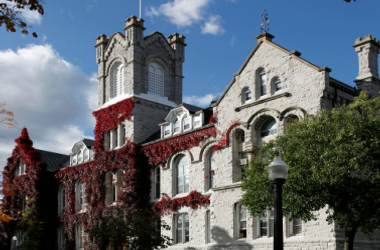 Queen's Theological College has officially become Queen's School of Religion. Our name change is an indicator of how we are responding to a need we see in our students and a significant change in Canadian culture.
Queen's Theological College has officially become Queen's School of Religion. Our name change is an indicator of how we are responding to a need we see in our students and a significant change in Canadian culture.
We are preparing clergy, primarily for the United Church of Canada, who will be ministering in a multifaith environment. We are helping to train highly qualified ministers who need theological skills, but also transformational skills in church leadership. We will have more emphasis on pluralism, formation, and leadership outcomes.
Mainline churches in Canada are in transition. We need leaders who can understand where the church fits in this change, and help people understand and live in our multifaith society. How do we transform ourselves into being an intercultural church? Theology graduates from the Queen's School of Religion will be leaders in preparing ministry personnel and chaplains attuned to that reality.
While we aim to expand our religious studies programs, we are also exploring innovations in the traditional M.Div. and M.T.S. programs to make them even more flexible for students. Queen's is one of two theological colleges in North America that offer a theological degree with an emphasis in restorative justice.
Bruce Hutchinson
Chair of the Board
Queen's School of Religion
Kingston, Ontario
St. Peter's Seminary
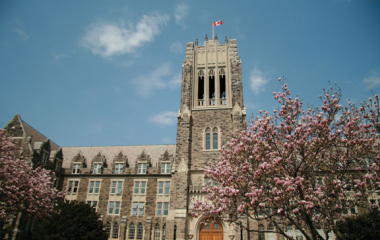 We are one of three English-speaking seminaries in Canada that teach and give spiritual formation to young men preparing to be priests in the Catholic church. We also educate lay women and men in our degree programs, as well as men — married and unmarried — who will serve as permanent deacons. The majority of lay students studying for the M.Div. or M.T.S. degrees are women preparing for full- and part-time ministry, either as pastoral workers in the church, as youth workers, or as chaplains in hospitals, prisons, or the military.
We are one of three English-speaking seminaries in Canada that teach and give spiritual formation to young men preparing to be priests in the Catholic church. We also educate lay women and men in our degree programs, as well as men — married and unmarried — who will serve as permanent deacons. The majority of lay students studying for the M.Div. or M.T.S. degrees are women preparing for full- and part-time ministry, either as pastoral workers in the church, as youth workers, or as chaplains in hospitals, prisons, or the military.
The recruitment we do is mainly through dialogue with bishops. We work closely with them to discern the call of young men to the priesthood, and then to inform them of the distinctive elements of our program.
Students who prepare for the priesthood here aren't just getting a solid academic formation, but also a practical, hands-on formation. We offer an integrated field education program at every level of studies, as well as immersing students in intensive spiritual foundations and formation.
Our primary goal is to discern if the students who come are suitable and mature for ministry. We want to form quality candidates who will serve the diocese with integrity, transparency, and faithfulness to the moral teachings of the gospel.
Father Stevan A. Wlusek
Rector
St. Peter's Seminary
London, Ontario
All school profiles compiled and edited by Karen Stiller.